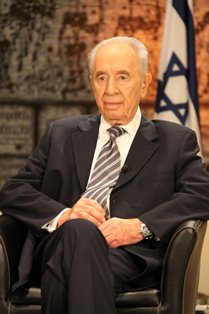 JERUSALEM (CNN) -- Israel's president conceded Tuesday his country may disagree with the White House at times over Iran's nuclear progress, but said he is "free of doubts" that U.S. President Barack Obama would use military force if necessary to stop Tehran from developing a nuclear bomb.
JERUSALEM (CNN) -- Israel's president conceded Tuesday his country may disagree with the White House at times over Iran's nuclear progress, but said he is "free of doubts" that U.S. President Barack Obama would use military force if necessary to stop Tehran from developing a nuclear bomb.
Iran is the top issue as Obama heads here for meetings with Israeli officials, including President Shimon Peres and, more importantly, Prime Minister Benjamin Netanyahu.
The prime minister has at times voiced concerns Washington has a less urgent view than Israel's of Iran's progress toward developing a nuclear warhead. But he has welcomed the administration's more muscular language of late that "all options" are on the table and that its policy is to prevent -- not contain -- a nuclear Iran.
Israeli officials took it as no coincidence that as he prepared for this trip, Obama told an Israeli TV station he believed there was still a year or so before Iran reached the final development stage -- suggesting he believes there is more time for diplomacy than the Israeli prime minister would like.
The Israeli presidency is a ceremonial position, but Peres is a father figure in politics here, and it was clear from his tone in the interview his overriding goal of the next few days is to project an image of close co-operation between the two allies.
"I do believe that the United States is following carefully the time and the progress," Peres said of the most recent Obama assessment of Iran.
"So a year is an estimation," Peres told CNN in an interview at his residence. "If something were to happen earlier, I am sure we will pay attention to the change.
"The main question you asked me, and the real answer I am giving you -- I trust what the president says. I am free of doubts. I think he is a man of values. He is a man that I respect his words. And he is a man that thinks before he speaks."
The clear threat of military action is designed to pressure Iran to negotiate a diplomatic settlement, but some Obama critics have voiced doubt Tehran takes seriously the threat of American military action.
Asked if he believed Tehran viewed the White House "all options" approach as serious, Peres said: "That I am not sure. I am not sure whether the relations between Iran and the truth are so intimate. I think they are capable of bluffing others and bluffing themselves."
He played down disagreements between U.S. and Israeli intelligence assessments of Iran's progress toward a bomb.
"There may be some differences in timing, but basically we support the policy of the president of the United States," Peres said.
Portland and Seattle
Free Subscription to Breaking News
Free Subscription to Breaking News






















































































































































































































































































































































